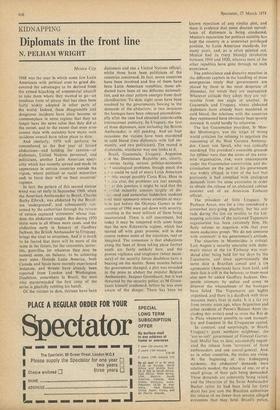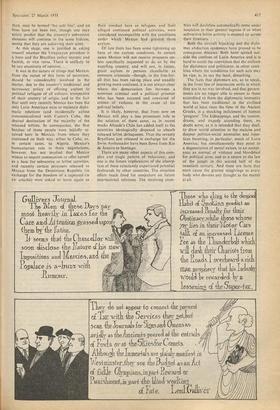KIDNAPPING
Diplomats in the front line
N. PELHAM WRIGHT
Mexico City 1968 was the year in which some few Latin Americans with political axes to grind dis- covered the advantages to be derived from the armed hijacking of commercial aircraft to take them where they wanted to go—an insidious form of piracy that has since been fairly widely adopted in other parts of the world. Indeed, these disagreeable and dangerous incidents have since become so commonplace in some regions that they no longer have the news value that they did at the outset, and to the extent that even tow cannot state with certainty how many such incidents overall have taken place to date.
And similarly, 1970 will perforce be remembered as the first year of forced abductions—and holding for ransom—of diplomats, United Nations personnel, and politicians, another Latin American speci- ality which has recently spread and made its appearance in certain countries outside the region, where political or racial minorities seek to force their will on their countries' regimes.
In fact, the pattern of this second sinister trend was set early in September 1969, when the American Ambassador to Brazil, Charles Burke Elbrick, was abducted by the Brazil- ian 'underground', and subsequently ran- somed by the authorities through the retease of certain captured 'extremists' whose free- dom the abductors sought. But during 1970 there were in all fifteen more cases, and the abduction early in January of Geoffrey Jackson, the British Ambassador to Jimmy, brings the total to seventeen, And it is much to be feared that there will be more of the same in the future, for the extremists, terror- ists, guerrillas (or whatever they may be named) seem, on balance, to be achieving their aims. Outside Latin America, both Canada and Spain have recently experienced instances, and threats have already been reported from London and Washington. Doubtless, somewhere in Brazil, the man who masterminded the first coup of the series is gleefully rubbing his hands.
Of the victims to date, thirteen have been diplomats and one a United Nations official, whilst three have been politicians of the countries concerned. In fact, seven countries have been involved and five of them have been Latin American republics; those ab- ducted have been of ten different nationali- ties, and no clear pattern emerges from their classification. To date, eight cases have been resolved by the governments bowing to the demands of the abductors; in two instances the hostages have been released uncondition- ally after the case had obtained considerable international publicity. In Uruguay, the fate of three diplomats, now including the British Ambassador, is still pending. And on four occasions the victims have been murdered in cold blood (two diplomats with full im- munity, and two politicians). The record is deplorable, whichever way one looks at it.
Brazil, Guatemala, Uruguay, Argentina .(1 the Dominican Republic are, clearly, ..intries facing serious politico-economic o. I sociological problems, though much the .r 'e could be said of every Latin American r .blic except possibly Costa Rica. Here in
.iC0 also, the problems are real enough,
at this juncture it might be said that the r ',ant minority consists largely of dis- liKoned and somewhat rudderless students nd their sponsors) whose attempts at may- ht.m just before the Olympic Games in the autumn of 1968 were put down with severity, resulting in the most militant of them being incarcerated. There is still resentment, but today it may be tempered with some hope that the new Echeverria regime, which has started off with great promise, will in due course redress some of the injustices, real or imagined. The consensus is that abductions along the lines of those taking place further south are fairly unlikely here, and the proven vigilance and toughness (when neces- sary) of the security forces doubtless have a bearing on the matter. Some months before the government changed, a plot was revealed in the press to abduct the popular Belgian Ambassador, Jacques Groothaert, but it was thwarted by the security police, as M Groot- haert himself confirmed, before he was even aware of the danger. There has been no known repetition of any similar plot, and there is evidence that some discreet surveil- lance of diplomats is being conducted. Mexico's reputation for political stability has kept the country in a somewhat privileged position, by Latin American standards, for many years, and, as is often pointed out, Mexico had its (very bloody) 'revolution between 1910 and 1920, whereas most of the other republics have gone through no such experience.
The ambivalence and disparity manifest in the different capitals in the handling of these emergencies imply that governments are placed by them in the most desperate of dilemmas, for which they are unprepared. Whatever attitude they adopt they are vul- nerable from one angle or another, In Guatemala and Uruguay, where abducted diplomats have already been murdered in cold blood, the relations with the countries they represented have obviously been spverly strained. It could hardly be otherwise.
The last Guatemalan president, Sr Men- dez Modtenegro, was the target of strong world criticism for refusing to negotiate the ransoming of the West German Ambassa- dor, Count von Spred, who was cynically murdered. The president's ostensible grounds for refusal were that the terms of the extre- mist organisation, FAR, were unacceptable under the Guatemalan constitution, and dis- crimination on the part of his government was widely alleged, in view of the fact that previously it had complied with analogous demands from the same extremists in order to obtain the release of an abducted cabinet minister and of an American Embassy official.
The prTesident of little Uruguay, Sr Pacheco Areco, was for a time considered a somewhat easy-going playboy, but his atti- tude during the last six months to the kid- napping activities of the outlawed Tupamaro organisation has been extremely firm. He flatly refuses to negotiate with that ever more audacious group. 'We do not converse with criminals' is his government's attitude.
The situation in Montevideo is critical. Last August a security specialist with diplo- matic status at the us Embassy was mur- dered after being held for ten days by the Tupamaros, and since approximately the same date a Brazilian consul and a UN agronomist (American) have been held, and their fate is still in the balance; to them must also now be added Geoffrey Jackson. Des- perate attempts by police and army to discover the whereabouts of the hostages have failed. The Tupamaros are highly organised, and there is a deadlock with three innocent men's lives at stake. It is a far cry from twenty years ago, when Argentines and other residents of Peron's Buenos Aires (in- cluding this writer) used to cross the Rio de la Plata whenever possible to seek tranquil- lity and freedom in the Uruguayan capital.
In contrast, and surprisingly, in Brazil, Uruguay's giant northern neighbour, the 'not-so-soft' government of General Garras- taz6 Medici has, to date, successfully negoti- ated the release from 'terrorists' of three ambassadors and one consul-general. And, as in other countries, the stakes are rising. At the beginning of this kidnapping epidemic, the abductors' demands were relatively modest, the release of one, or of a small group, of their pals being demanded. These demands are constantly being raised, and the liberation of the Swiss Ambassador Bucher (after he had been held for forty days) has just cost the Brazilian authorities the release of no fewer than seventy alleged extremists that they held, Brazil's policy, then, may be termed 'the soft line', and no lives have yet been lost, though one may safely predict that the country's subversive elements will continue in the same fashion, seeing that they are achieving their aims.
At this stage, one is justified in asking oneself whether the Uruguayan president is a hero and the Brazilian policy myopic and foolish, or vice versa. There is unlikely to be any unanimity of opinion. • It was in the nature of things that Mexico, from the outset of this form of terrorism, should be considerably involved in the matter, due to the country's traditional and sacrosanct policy of offering asylum to political refugees of all colours, irrespective of their country of origin, and to the fact that until very recently Mexico has been the only Latin American state to maintain diplo- matic relations (and incidentally airline communications) with Castro's Cuba, the desired destination of the majority of the released leftists. In consequence, the first batches of these people were initially re- ceived here in Mexico, from where they continued on their way, either to Cuba, or, in certain cases, to Algeria. Mexico's humanitarian role in these negotiations, however, has not implied that Mexico wishes to import communism or offer herself as a base for subversive or leftist activities, and recently certain prisoners released to Mexico from the Dominican Republic (in exchange for the freedom of a captured us air attaché) were asked to leave again as their conduct here as refugees, and their alleged continued political activities, were considered incompatible with the conditions under which Mexico had granted them asylum.
Of late there has been some tightening up here of the asylum conditions. In certain cases Mexico will not receive prisoners un- less specifically requested to do so by the expelling country, and will not, in future, grant asylum to persons classifiable as common criminals—though, in the free-for- all that has been taking place and steadily growing more confused, it is not always clear where the demarcation lies between a common criminal and a political prisoner who has been accused and convicted of crimes of violence in the cause of his political beliefs.
It is likely, however, that from now on Mexico will play a less prominent role in the solution of these cases, as in recent weeks Allende's Chile has added itself to the countries ideologically disposed to absorb released leftist delinquents. Thus the seventy Brazilians just released in exchange for the Swiss Ambassador have been flown from Rio de Janeiro to Santiago.
There are many other aspects of this com- plex and tragic pattern of behaviour, and one is the future implications of the absorp- tion of these reluctantly expatriated potential firebrands by other countries. The situation offers much food for conjecture on future international relations. The receiving coun-
tries will doubtless automatically come under suspicion in their general regions if or when subversive leftist activity is stepped up across their frontiers.
Both the aircraft hijacking and the diplo- mat abduction epidemics have proved to be contagious diseases. Both have spread out- side the confines of Latin America and it is hard to avoid the conviction that the outlook for diplomats and politicians, in other coun- tries where the conditions for such acts may be ripe, is, to say the least, disturbing.
The facts that diplomats are, so to speak, in the front line of internecine strife in which they are in no way involved, and that govern- ments are no longer able to ensure to those accredited to them the diplomatic immunity that has been traditional in the civilised world at least since the time of the Ancient Greeks, is a shocking indictment of human 'progress'. The kidnappings, and the tension, drama, and tragedy attending them, no doubt serve, as it is intended that they shall, to draw world attention to the malaise and deepset politico-social anomalies and injus- tices besetting, in particular, much of Latin America; but simultaneously they point to a degeneration of moral values, to an accept- ance as normal of violence and bloodshed for political aims, and to a return to the law of the jungle in the second half of the twentieth century. And these are facts that must cause the gravest misgivings to every body who devotes any thought to the matter at all.











































 Previous page
Previous page